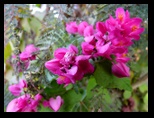

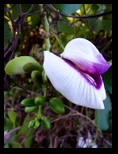
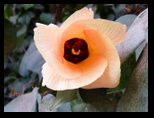
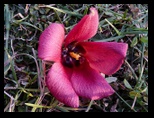
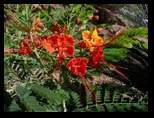
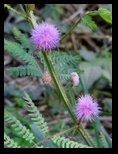
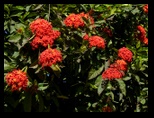
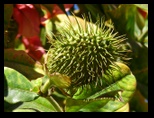


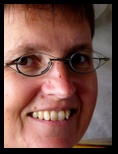
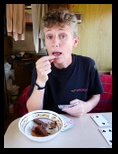
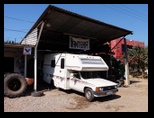
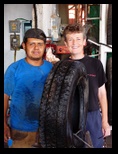
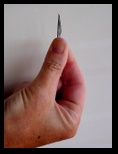
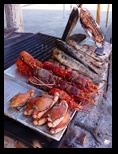
Click on a photo to enlarge it.
We got down to the dentist in La Penita only to find out that the specialist had an emergency and wasn't coming. So Helen's appointment was
cancelled and she got a new one for the following Wednesday. We could have stayed in Teacapan longer and had more time to spend with
Brian and Lily who had only just arrived when we had to leave!
We parked up at the same place as we had last February to April - on a street outside a camp ground that had been closed down. But
this year it had been re-opened mainly because of the campers who stayed here every year. We found this out from Ursula from northern
Germany who came out to talk to us even before we had parked up!
A few minutes later Lyle, who got us a house sitting place last summer, came along for happy hour with Ursula. Small world!
Finally Helen got in to have the surgery to cut her gum and extend the amount of tooth available for a crown to be fixed. It took
less than an hour and she only had to have one stitch.
Helen had resigned herself to soup for a week. What she didn't expect was when the dentist said she couldn't have any hot drinks until
the next day. What ... no tea!!! I say old chap that is just not on! Fortunately Helen found a very easy solution - drink on the other
side of her mouth and used ice water on the stitch to help with the swelling. Perfect!
Two days later she went back for impressions which we didn't think would be possible because of the swelling.
Next thing she knew she was given injections where her gum had been cut away and stitched only two days earlier! Ouch! But that was
only the start. It took 1.5 hours whilst she had the temporary filling drilled out and the impressions done. She was even more swollen
afterwards!
Helen actually ended up eating more than she normally does. Amazing how the thought of not being able to eat makes you hungry all the
time. But there was still a ban on spicy and oily food and even Kirsten had to laugh when she started cutting up a milky way into small
pieces so each piece could be melted in her mouth rather than chewed! Improvisation is the game!
You might think that Helen would be the one in a bad mood - but you would be wrong ... it was Kirsten! She couldn't go boogie boarding
in the water because there were no waves and it was too cold. Then the man selling DVDs on the market wasn't there anymore so we
couldn't get any new films. It was too loud compared to Teacapan, with cars and their loudspeakers constantly spreading messages about
what they had to sell, far more people than at our beach although there are still a lot fewer tourists here compared to last year.
So Kirsten couldn't wait to get back to Teacapan.
Finally she cut her nose in the shower. She was shaving her legs and then got water in her eyes. So she went to get the water out and
forgot that she had the plastic shaver cover in her hand and scratched her nose. She bled quite a bit and ended up having an inch long
scab on her nose and had to put up with people staring at her!!
Then we had two men peeing on Winnie one afternoon as we were sitting inside and a little kid threw a stone onto our roof. Is there no
common decency and respect in our world anymore?
We also had a flat tyre - inside rear, as usual. We only discovered it because Kirsten went into the back to get a drink whilst we were
driving and heard a funny noise. We went to a garage where the mechanic had a real job getting a long thin piece of metal out of the
tyre so he could patch it.
Then we forgot to put some new teflon tape around the valve and lost air over the next few days. So we had to go back in to get them
to take the tyres off again so we could put the tape on. That cost more than the patch!!
The camp grounds are also charging more this year, probably because there are less people coming down. But Delia's camp ground was
almost double the cost from last April! We managed to find a smaller one in the next bay at Los Ayalas. It was still far more expensive
than Teacapan or Álamos but it was only one year old with a swimming pool and washing machines in a quiet little town.
Helen got her temporary crown and then we decided to go back to Teacapan as the next appointment wouldn't be until the beginning of
February to wait for the healing process to complete. It would mean that we only had two weeks in Teacapan before driving back but
Kirsten was NOT going to stay in Rincon!!
On the drive back we stayed at a Pemex (petrol station) for the night and watched a film called "The Cove".
The Cove is a 2009 documentary film that describes the annual killing of dolphins in a Quasi-National Park at Taiji, Wakayama, in Japan.
It claims that 23,000 dolphins and porpoises are killed in Japan every year in the country's whaling industry. The migrating dolphins
are herded into a hidden cove where they are netted and killed by means of spears and knives over the side of small fishing boats.
The film follows former dolphin trainer Ric O'Barry's quest to document the dolphin hunting operations in Taiji. In the 1960s, O'Barry
helped capture and train the five wild dolphins who shared the role of "Flipper" in the hit television series of the same name.
The show, a pop-culture phenomenon, fueled widespread public adoration of dolphins, influencing the development of marine parks that
included dolphins in their attractions. After one of the dolphins, in O'Barry's opinion, committed a form of suicide in his arms by
closing her blowhole voluntarily in order to suffocate, O'Barry came to see the dolphin's captivity as a curse, not a blessing.
The film states that the dolphin hunt is, in a large part, motivated by the tremendous revenue generated for the town by selling some
of the captured dolphins to aquariums and marine parks (150.000 US$ per dolphin). The dolphins that are not sold into captivity are then slaughtered in the cove
by the fishermen and the meat is sold in supermarkets (600US$ for a dead dolphin). Dolphin meat contains dangerously high levels of mercury.
Since 2000, Japanese researchers have found high concentrations of mercury, which can cause mercury poisoning, in the whale and dolphin
meat sold around Japan. In their studies, Taiji residents who eat whale/dolphin meat had high levels of mercury in their hair.
Residents have been found to have 10 times the level of mercury when compared to average Japanese citizens and up to a 160 times higher than normal.
The documentary won the U.S. Audience Award at the 25th annual Sundance Film Festival in January 2009. On March 7, 2010, The Cove won the
Oscar Academy Award for Best Documentary Feature at the 82nd Academy Awards.
More information under www.opsociety.org.
We were very depressed after watching the film because it shows what the human species is capable of. We are destroying the only place
we know of where we can actually survive. Money is the main motive.
In Japan the main diet is fish. Dolphins are classed as whales and the meat is sold as whale meat. But the dolphins are at the end of
the food chain whereby the mercury content in the sea, used as a dumping ground by various industries, is consumed by plankton which
are eaten by an ever increasing scale of larger sea life and fish. By the time the dolphins eat the fish the mercury content is at
highly toxic levels.
The film shows that the Japanese had a school lunch programme that included dolphin meat and the children must eat all of their lunch.
The meat is so toxic that they are literally poisoning their own children by force. As a result of the film this has been stopped but
dolphin meat is still being sold in the supermarkets.
The film also points out the problems of over fishing and that we are depleting the fish stocks at such an alarming rate that we are
heading for disaster in a matter of decades. We have seen this problem in Teacapan. Fishermen go out to catch shrimp but around 95% of
what is caught and killed in their nets are other forms of sea life. And that is just in one place here in Mexico. What about worldwide?
Helmut, Agnes and Kirsten go out fishing every third day but they only catch what they want to eat and anything too small is thrown
back in - alive. If all humans became vegetarian that would not solve the problem because we would need land to cultivate more crops,
forests would be cleared and more pesticides and insecticides ... etc etc.
There are too many humans for our planet to sustain and we are doing a very good job of destroying it! If our planet had survival
instincts it would get rid of the humans. Maybe we should do something before it comes to that!
Are you depressed enough yet?